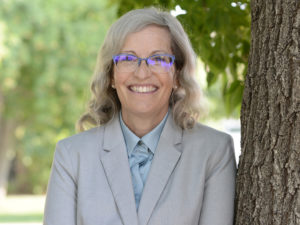
Before joining the Colorado State University School of Social Work as a faculty member, Jen Currin-McCulloch worked as an oncology and palliative care social worker for over two decades. Moving from practice to research, she now is the director of the Serious Illness and End of Life Narratives Lab, which studies and documents the experiences of people who have serious or terminal illnesses; she also studies the human-animal bond.
In a first-of-its-kind study, Currin-McCulloch is researching the experiences of breast cancer survivors who have pets and is looking for participants. She is partnering with Lori Kogan, a professor in the Department of Clinical Sciences in the College of Veterinary Medicine and Biomedical Sciences. Kogan studies human-animal interactions and the bond we share with companion animals.
“I have a cancer lens, and a human-animal bond lens,” said Currin-McCulloch, who is also an affiliate faculty member at the CU Anshutz Medical Campus. “I saw a call for a CU-CSU pilot, and thought ‘wouldn’t it be great to bring this all together?’”
Identifying a need
“I was thinking about how we never ask people how they’re going to take care of their pet when they come in for cancer treatments,” Currin-McCulloch said. Many studies show that people think of their pets as family members – that they’re equally as important as the people in their lives. “We wanted to study how this all relates, raising a child and raising a four-legged furry friend,” she said.
To do this, Currin-McCulloch and her research partner, Kogan, launched this project, along with Linda Cook, the associate director of the University of Colorado Comprehensive Cancer Center at CU Anschutz, to study the relationship between breast cancer survivors and their pets. They started by adapting surveys and scales previously used to study parent-child relationships, to human-animal relationships. “We ask questions like ‘during your treatment, when have you been most concerned about your pet?’ and ‘does your pet offer any buffer for stress since your diagnosis?’” The study also looks at end of life. “Should the cancer turn terminal, what plans do these women have for their pets?
Expanding the study
This study is the first of its kind, “so we’re hoping to figure out what the concerns and experiences are of these women so that providers and family members can offer a more proactive approach to cancer survivors and their pets,” Currin-McCulloch said. “Our goal is to expand this beyond breast cancer.” Currin-McCulloch and Kogan chose breast cancer because it is one of the most common cancers and has a high survival rate. “We want to explore the human-animal bond in other illnesses and extend the survey to other genders – trans and nonbinary folx as well,” Currin-McCulloch said.
Currin-McCulloch and Kogan expect that the support cancer survivors need will be financial and physical, among other things. “Many women can’t carry more than a jug of milk after surgery. If you live alone that can be a real challenge in caring for a pet.”
Finding resources and connecting patients
The graduate research assistants working on this study are helping build a database of resources for cancer survivors with pets, with services including doggy daycares, mobile pet groomers, house sitters, dog walkers, and more. The research assistants have aggregated more than 800 organizations and resources along the Front Range. “Our goal is to build an interactive map that patients can use to see what resources are near them, to help reduce the stress of ‘where do I even start?’” said Currin-McCulloch. This resource will be accessible to anyone at the end of the study, not just breast cancer survivors.
The research team has surveyed over 400 women and hopes to reach 1000 by the end of March. If you or anyone you know qualifies to participate, you can access the survey online.
More info about the study
The School of Social Work and College of Veterinary Medicine and Biomedical Sciences at CSU and the University of Colorado Comprehensive Cancer Center are leading a study to discover how the diagnosis and treatment of breast cancer impact women’s relationships with their cat or dog. They invite Colorado women (ages 18 and older) who have been diagnosed with breast cancer and are at any stage of treatment or recovery to participate in a brief (10-15 minute) survey about how their bond with the dog and/or cat has been impacted since their diagnosis. Everyone who completes the survey can enter a raffle for a $100 Chewy.com gift card. Complete the survey and share your story.
The School of Social Work is part of CSU’s College of Health and Human Sciences.